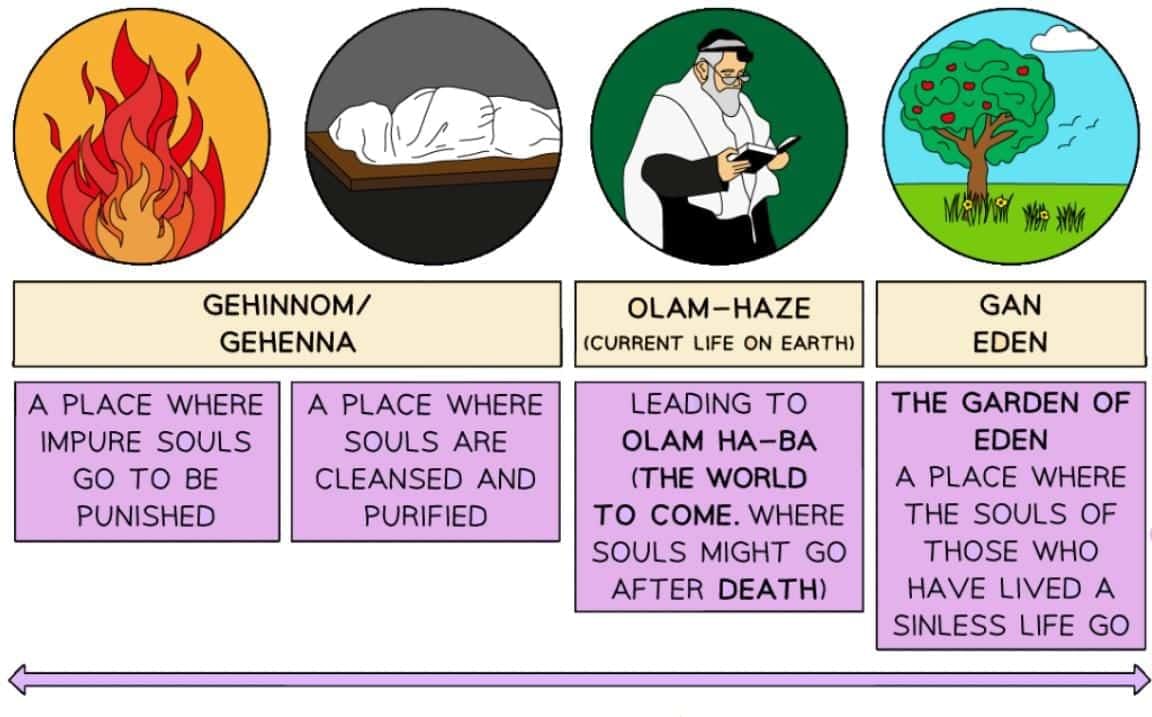Judaism & Beliefs About the Afterlife | Religion, Philosophy & Ethics for GCSE/IGCSE - Year 11 PDF Download
| Table of contents |

|
| Ideas in Judaism About Life After Death |

|
| Life as Preparation for the Afterlife |

|
| Rosh Hashanah and Divine Judgment |

|
| Judaism & Judgment |

|
| Judaism, Sheol, Gehinnom, and Gan Eden |

|
Ideas in Judaism About Life After Death
Judaism encompasses beliefs about an afterlife but lacks a unified doctrine on the subject.
Life as Preparation for the Afterlife
Judaism emphasizes earthly life as preparation for Olam Ha-Ba, meaning "the world to come," which many Jews anticipate.
- The Mishnah compares this world to a lobby for Olam Ha-Ba:
“This world is like a lobby before the Olam Ha-Ba. Prepare yourself in the lobby so that you may enter the banquet hall” (Pirkei Avot 4:21).
- Olam Ha-Ba may refer to the afterlife or the Messianic Age on earth.
- Belief in an afterlife, rooted in the Torah, gives life meaning and purpose.
Rosh Hashanah and Divine Judgment
Rosh Hashanah, often called the Day of Judgment, prompts Jews to reflect on their actions over the past year.
- God, embodying justice and mercy, judges individuals based on adherence to the Torah’s commandments.
- During Rosh Hashanah, every person faces divine judgment.
Judaism & Judgment
Many Jews believe God evaluates their deeds to determine their afterlife fate.
- Ecclesiastes 12:14 states:
“God will bring every deed into judgment … whether it is good or evil.”
- The judgment hinges on how well individuals have observed the Mitzvot (commandments).
- Views on the timing and nature of the Day of Judgment vary:
- Orthodox Jews often believe the Day of Judgment, or Yawm ad-Din, follows the Messiah’s arrival:
- They anticipate physical resurrection:
“Your dead will come to life” (Isaiah 26:19).
“Many will awaken, some to everlasting life, some to shame” (Daniel 12:2).
- Consequently, practices like cremation or autopsy, which alter the body, are prohibited.
- Resurrection is referenced daily in prayers and at funerals.
Reform Jews, rejecting the concept of a Messiah, believe judgment occurs immediately after death:
- Only the soul is resurrected, as the body is seen as a mere vessel.
- References to physical resurrection are omitted from Reform prayer books (siddur).
- Some Jews believe in dual judgments: one at death and another by the Messiah on the Day of Judgment.
- Others hold that resurrection on the Day of Judgment applies to all, with moral worth determining outcomes:
“Multitudes who sleep in the dust of the earth will awake; some to everlasting life, others to shame and everlasting contempt” (Daniel 12:2).
- Alternatively, some believe only the righteous are resurrected, while the unrighteous face punishment in hell.
Judaism, Sheol, Gehinnom, and Gan Eden
Most Orthodox Jews believe that those who follow God’s laws enter Heaven after death, though Jewish scriptures do not explicitly describe Heaven.
- The Talmud associates Olam Ha-Ba with the afterlife, often using Gan Eden (Garden of Eden) to describe a heavenly realm for souls post-death.
- Gan Eden evokes the idyllic existence of Adam and Eve before the Fall.
- Some envision Gan Eden as a place of harmony where people of all nations share meals during the Messianic Age.
- Many Jews believe the afterlife is free from the suffering experienced in this world.
- Others view Gan Eden as a spiritual state of closeness to God rather than a physical place.
- The virtuous are believed to reunite with loved ones, their souls enduring.
- Souls of the sinless go directly to Gan Eden, while others may enter Sheol or Gehinnom:
- Sheol: A place of purification, akin to Catholic purgatory, where souls are cleansed.
- Gehinnom (Gehenna): A place of torment for punishment.
“For the grave shall not thank You, nor shall death praise You; those who descend into the pit shall not hope for Your truth” (Isaiah 38:18).
- Those who believe in life after death may hold differing views about whether or not there exists a place for eternal punishment
- Some believe that the souls of those who have committed serious acts of evil - for example, murder, will never move on from this place of torment as they cannot be changed for the better

|
172 docs|3 tests
|
FAQs on Judaism & Beliefs About the Afterlife - Religion, Philosophy & Ethics for GCSE/IGCSE - Year 11
| 1. What are the main beliefs about life after death in Judaism? |  |
| 2. How does Rosh Hashanah relate to the concept of divine judgment in Judaism? |  |
| 3. What is the significance of Sheol in Jewish beliefs about the afterlife? |  |
| 4. How do Jewish teachings view the concept of judgment after death? |  |
| 5. How do the concepts of Gan Eden and Gehinnom differ in Jewish thought? |  |














